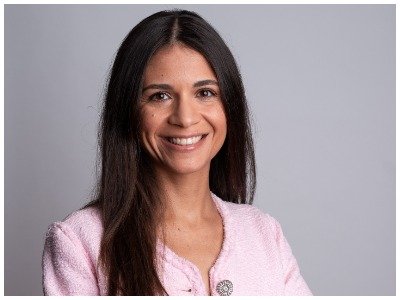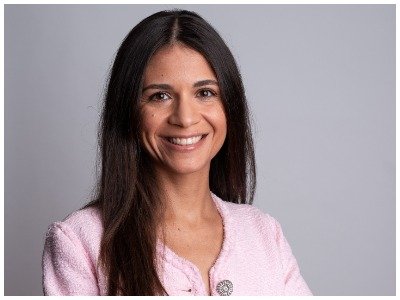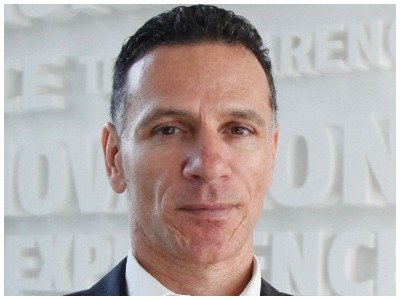CCA’s ace up its sleeve

In this month’s Portugal edition of Young and Unstoppable, the spotlight shines on Alcina de Oliveira Alves. The lawyer has devoted her entire almost ten year career to CCA. While initially cherry picked from Law school during the final year of her Energy Master’s, to work with the firm in this sector, de Oliveira Alves quickly realised her true calling was in the TMT area. The leading international directories also agree and since Online-Gambling became legal in Portugal since 2015, Alcina has carved out a niche in this space. This interview is a must read, especially for any young Law graduates wrongly assuming that ones legal career has to be decided from the outset. As you will see from her own words, Alcina went from Administrative Law, to TMT and is now “all-in” when it comes to Online-Gambling.
 You have spent your entire career to date in private practice at CCA. What motivated you to join CCA specifically, after Law school?
You have spent your entire career to date in private practice at CCA. What motivated you to join CCA specifically, after Law school?
I feel like I didn’t choose CCA after Law school. It was the other way around, a fact for which I’m grateful as I’m not sure the firm would have been in my plans otherwise, or where I would professionally be without it. The year was 2013 (I’m going to risk somewhat around June). I had already finished the lecture part of my master’s degree in Energy Law, and I had decided that until I concluded my thesis, something I was fully committed to, I would not start practicing. But then, Professor Henrique Salinas (that lecturer at the Faculty of Law of the Catholic University and a Partner at CCA) phoned me. Back then, the firm was managing a high relevance Energy project and they needed a trainee/junior with specific knowledge in said field. It was an irrefutable invitation. They were inviting me to focus 100% of my time in a field I was trying to specialise in. Additionally, at that time CCA already had a great reputation at the Catholic University. Besides Henrique Salinas another partner, Rita Cruz, also lectured there. The firm was clear that they needed my collaboration only for five months, which was also great considering I could then return to my thesis… I guess in my case, the question would be more appropriate if it was “what motivated you to remain?”. Well, at CCA I’ve found (something still present) a youthful and relaxed environment. You can be who you want to be and quite frankly I’m far from the classical lawyer archetype, so that was very important to me, working in a firm that allowed me to express my personality freely. It is also appealing that we keep building the brand to this day, so you can contribute towards it and someday look back and say “I did this, we did this”. Additionally, it is not an environment that makes you feel like a disposable, easily replaceable part of a machine, even when you are a trainee-lawyer. That is beyond priceless and if it wasn’t like this, I probably would not be able to build the career I’m building. It makes me truly proud and accomplished: to look back and clearly see constant growth.
When did you decide you wanted to become a lawyer? What attracted you to the legal profession?
I entered Law school not wanting to become a lawyer. I was looking for a career in Foreign Affairs, I wanted to be a diplomat. I sought prior advice and most diplomats in Portugal come from a Legal academic background. However, I decided I wanted to be a lawyer shortly after enrolling in my Faculty at Lisbon University and I didn’t think twice when later it was time to join the Portuguese Bar Association. I would say a very attractive aspect related to the profession (and that represents at the same time its very best and worst) is that it is very challenging, you realise that in Law school and confirm it from the moment you start practicing. It doesn’t matter how many times questions on an exact same subject are asked, they will always be different. There are always little details and nuances, a word may completely shift the meaning of what is asked and therefore of what must be clarified. You can never be too certain of your own knowledge, you must keep studying, learning, evolving, but you will certainly never get bored and I strongly dislike and resent the feeling of boredom.
Which individuals have made the biggest impact on your career to date?
Definitely the people with whom I’ve worked or work everyday at CCA, this includes the clients. It is easy to get inspired when you’re venturing into a new world, namely starting a career. It is impossible not to feel mesmerised by the academics who help you build the foundations of your career, and I had the best at Lisbon University among which current Portuguese President Marcelo Rebelo de Sousa, one of the fathers of our Fundamental Law Jorge Miranda and the brilliant academic António Menezes Cordeiro (this to name a few, I was very privileged in what concerns teachers). It didn’t take me much though, to realise the value of the people that surround me daily, those are the ones that made me, those are the ones that cause real impact. It still puzzles me how these busy people took (and keep taking) so much of their time to teach and guide me. I’m forever grateful to so many individuals that work or have worked at CCA. I wouldn’t dare name them here (I would inadvertently exclude someone that matters). That being said, I will open an exception for Filipe Mayer: great lawyer, great teacher and above all a remarkable human being.
Did you always have your eye on developing your practice in the TMT area?
Far from it. I did a Master’s degree in Energy Law, I wanted to work in that field and as mentioned before, I started my collaboration with CCA focusing on an Energy project. I thought Administrative Law was my future. But when I started working in August (a classic vacation period) an important International Public Tender whose core subject related to TMT had just started. Domingos Cruz (CCA’s managing partner) called me to be part of the team that dealt with said Tender and that was my entrance door to TMT. I started gradually doing more and more of it, enjoying it and feeling that I was learning and growing professionally. I started to crave (yes, trust me, it is the appropriate word) to be more involved in TMT subjects. I entered the firm in August 2013 and by December 2013, I was already fully convinced that TMT would be my future.
Has there been a definitive moment in your legal career to date?
Yes, and it was back in 2015 when Online-Gambling, illegal in the Portuguese jurisdiction until then, became a licensed activity. Anticipating that possibility Filipe Mayer started working in the field many years before, paving the way for a licensed market and its legal challenges. I dare to say no other lawyer was as prepared as Filipe for this new market and for the legal opportunities that arose from it. Originally, I was not destined to collaborate with Filipe on gambling matters. But there it was, something that I saw as an opportunity of a lifetime, so I pushed for it. How many lawyers can say I was there, I was there from the very beginning, when no one knew exactly what to do, when there was nothing written regarding the new law and regulations and how to interpret them? We had to create everything from zero for our clients and for ourselves. There was no basis to start working, we had to make them. This was very challenging and stressful yet fun and rewarding. There were no manuals written, no case studies, no doctrinal opinions. But now I can proudly say my professional life is forever linked to the birth of this new market and that I’m working in it from day one and that is extraordinary.
You have been recognised by some of the leading directories for your work with clients in the Online-Gambling and Advertising sectors. What challenges and opportunities exist in this space?
Regarding advertising it is challenging to work with a code from 1990 and that is to a certain extent outdated considering the online reality of our days (this even considering the guidelines issued by ICAP). Besides much needed updates (for example concerning the use of children in ads), there are several gaps to fill regarding ads in social media platforms, being also here where the opportunities in this sector reside. As for Online-Gambling, it is still a market of opportunities, there are not many lawyers doing it and the market is ready to absorb more. However, while there is a need for more specialised lawyers in the field, the online gambling market itself may become saturated in the next few years with the associated consequences. Portugal doesn’t limit the number of licenses that can be awarded and currently we have fifteen licensed entities and 25 licenses issued. The Online-Gambling market faces many other challenges I would like to address, but I would need a specific article just for this topic.
What impact do you think legal tech will have at your firm and on the sector as a whole?
In any occupation, Law being no different, some of the tasks managed daily are repetitive, require no creativity or demand endless hours perusing documents to find and highlight a small but important detail. Unnecessary mistakes can occur. I envision that legal tech will decrease professional risks that are easily avoidable while at the same time reducing time spent on matters through the management of secondary aspects of the practice. Legal tech should allow us to limit the professional risk to the core work developed by a lawyer, like contractual or legal interpretation, risk assessment of an activity or action, building a defense or accusation. CCA keeps developing its best efforts to implement legal tech. We’ve greatly evolved in what concerns billing and we keep working on aspects connected to documents management. I’m certain the firm will not stop here.
What advice would you give to Law graduates looking for a career in private practice? Has anything changed since you started at CCA?
My main advice is to keep an open mind and to not get stuck in any preconceived ideas you have on your career when you finish Law school. Take my example. From Administrative Law to TMT and then an all-in (no pun intended) in Online-Gambling. If eight years ago a time traveler had told me this would be my professional path I would laugh in disbelief. But here I am, and I couldn’t be happier, I’m glad I took the risks I took. I regret nothing and it feels great to say it. Finally, if I must pinpoint a change since I started at CCA it will be the growing need of legal professionals specified in matters per opposition of having a general knowledge on a certain field. Take TMT as an example. You can hardly master all the matters that fit into said field. So, you need a department formed by lawyers dedicated specifically to data protection, to telecommunications, to technologies etc. We live in a complex world ruled by complex relations. General knowledge on a certain matter may come in handy, but will not take you far nowadays.
What has been the worst and best day of your career so far?
This is what makes me stay at CCA, I have so many good days there I could not pick one among so many. Any day that I laugh (actually laugh, not a grin or smile) with my colleagues or my clients is a great day, and I’m fortunate to have many of those. With that being said, a great day was when in December 2017, just one year after finishing the Bar Association, CCA appointed me as lawyer of the year. That made me happy because it was a hard year, both personal and professionally wise, and I felt the firm recognized my effort. As for worst, any day you feel you’ve made a mistake, that you’re not as diligent as you should and that your actions may affect your clients or the relationship you have with them. I have had some of those days by now, but as much as a cliché to say something like this, if you’re not failing, you’re not trying and that will lead you nowhere.
Do you think there are new skills that lawyers will need to develop during the next 10 years?
Adaptation, adaptation and adaptation. Just look at us, being a lawyer is such a classical occupation. You don’t need to go far back in time to find these men in their ivory towers, untouchable. Clients would approach with caution and reverence. We are no longer there, but we have a long way to go. Clients want to feel that lawyers are part of their team. Clients want lawyers to share the same enthusiasm they do for their new product yet to be launched and that lawyers understand its mechanics like the engineer that created it. We are no longer working from a tower, distant and protected. We are seated at the client desk every day.
By Michael Heron
To read the full interview on issue number 107 click here












